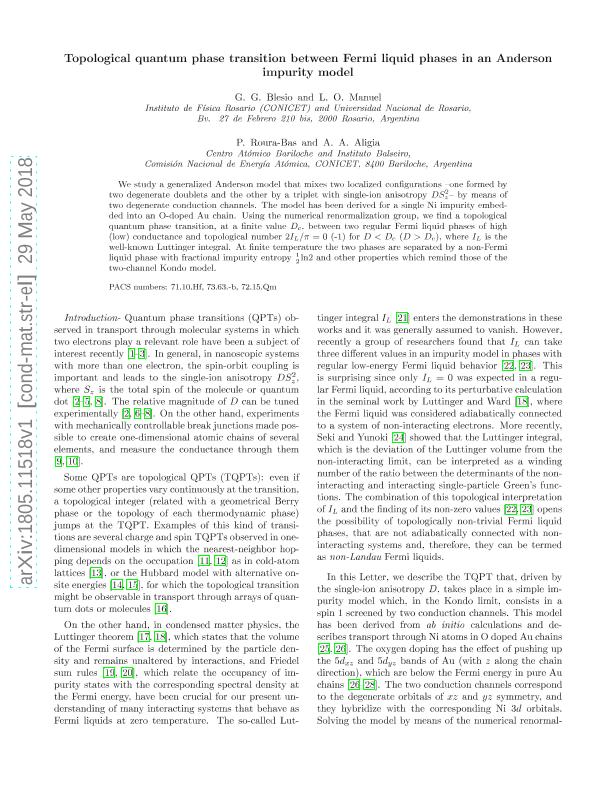Mostrar el registro sencillo del ítem
dc.contributor.author
Blesio, Germán Gabriel

dc.contributor.author
Manuel, Luis Oscar

dc.contributor.author
Roura Bas, Pablo Gines

dc.contributor.author
Aligia, Armando Ángel

dc.date.available
2020-04-08T21:12:20Z
dc.date.issued
2018-11
dc.identifier.citation
Blesio, Germán Gabriel; Manuel, Luis Oscar; Roura Bas, Pablo Gines; Aligia, Armando Ángel; Topological quantum phase transition between Fermi liquid phases in an Anderson impurity model; American Physical Society; Physical Review B; 98; 19; 11-2018; 1-15; 195435
dc.identifier.issn
2469-9950
dc.identifier.uri
http://hdl.handle.net/11336/102312
dc.description.abstract
We study a generalized Anderson model that mixes two localized configurations-one formed by two degenerate doublets and the other by a triplet with single-ion anisotropy DSz2-by means of two degenerate conduction channels. The model has been derived for a single Ni impurity embedded into an O-doped Au chain. Using the numerical renormalization group, we find a topological quantum phase transition, at a finite value Dc, between two regular Fermi liquid phases of high (low) conductance and topological number 2IL/π=0 (+1) for DDc), where IL is the well-known Luttinger integral. At finite temperature the two phases are separated by a non-Fermi liquid phase with fractional impurity entropy 12ln2 and other properties which are similar to those of the two-channel Kondo model.
dc.format
application/pdf
dc.language.iso
eng
dc.publisher
American Physical Society

dc.rights
info:eu-repo/semantics/openAccess
dc.rights.uri
https://creativecommons.org/licenses/by-nc-sa/2.5/ar/
dc.subject
generalized Anderson model
dc.subject
topological quantum phase transition
dc.subject
Luttinger integral
dc.subject
single-ion anisotropy
dc.subject.classification
Física de los Materiales Condensados

dc.subject.classification
Ciencias Físicas

dc.subject.classification
CIENCIAS NATURALES Y EXACTAS

dc.title
Topological quantum phase transition between Fermi liquid phases in an Anderson impurity model
dc.type
info:eu-repo/semantics/article
dc.type
info:ar-repo/semantics/artículo
dc.type
info:eu-repo/semantics/publishedVersion
dc.date.updated
2019-10-15T17:53:43Z
dc.journal.volume
98
dc.journal.number
19
dc.journal.pagination
1-15; 195435
dc.journal.pais
Estados Unidos

dc.description.fil
Fil: Blesio, Germán Gabriel. Consejo Nacional de Investigaciones Científicas y Técnicas. Centro Científico Tecnológico Conicet - Rosario. Instituto de Física de Rosario. Universidad Nacional de Rosario. Instituto de Física de Rosario; Argentina
dc.description.fil
Fil: Manuel, Luis Oscar. Consejo Nacional de Investigaciones Científicas y Técnicas. Centro Científico Tecnológico Conicet - Rosario. Instituto de Física de Rosario. Universidad Nacional de Rosario. Instituto de Física de Rosario; Argentina
dc.description.fil
Fil: Roura Bas, Pablo Gines. Comisión Nacional de Energía Atómica. Gerencia del Área de Energía Nuclear. Instituto Balseiro; Argentina. Consejo Nacional de Investigaciones Científicas y Técnicas; Argentina
dc.description.fil
Fil: Aligia, Armando Ángel. Consejo Nacional de Investigaciones Científicas y Técnicas; Argentina. Comisión Nacional de Energía Atómica. Gerencia del Área de Energía Nuclear. Instituto Balseiro; Argentina
dc.journal.title
Physical Review B
dc.relation.alternativeid
info:eu-repo/semantics/altIdentifier/doi/https://doi.org/10.1103/PhysRevB.98.195435
dc.relation.alternativeid
info:eu-repo/semantics/altIdentifier/url/https://journals.aps.org/prb/abstract/10.1103/PhysRevB.98.195435
dc.relation.alternativeid
info:eu-repo/semantics/altIdentifier/url/https://arxiv.org/abs/1805.11518
Archivos asociados
